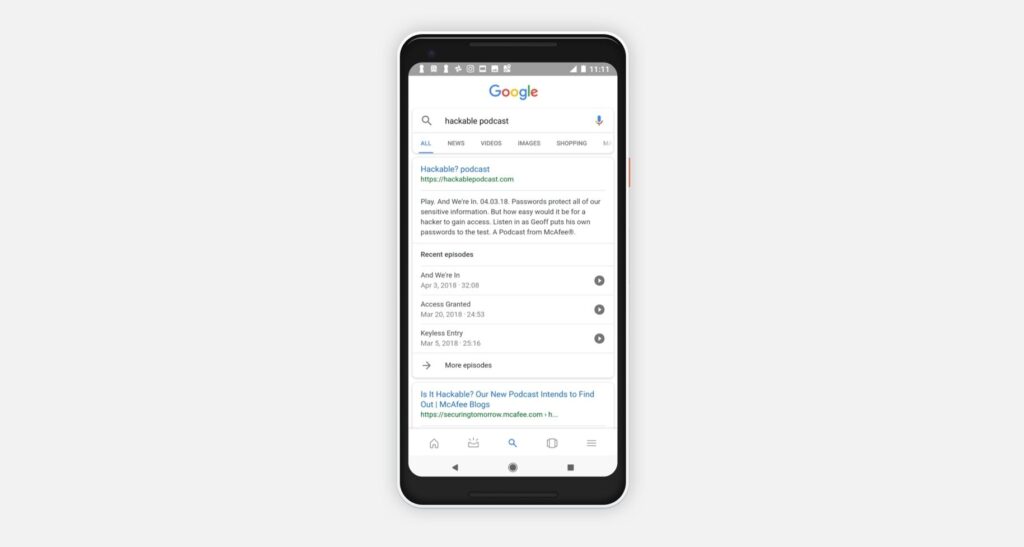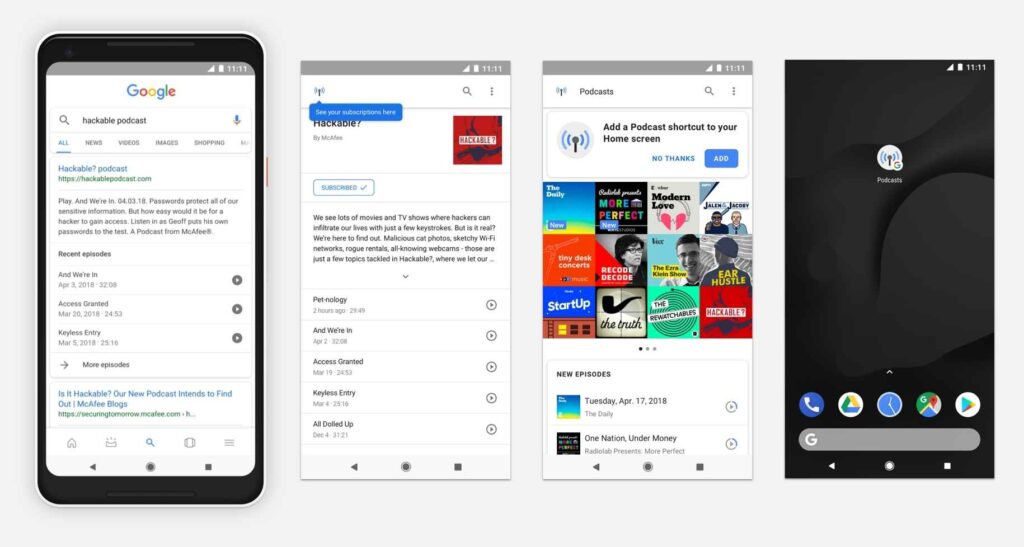Exclusive: Inside The New Google Podcasts Strategy That Could Double Audiences Worldwide
Google has a new podcasting strategy that completely reimagines how people find and listen to shows. This is part one of our exclusive five-part series.

“Our team’s mission is to help double the amount of podcast listening in the world over the next couple years,” says Google Podcasts Product Manager Zack Reneau-Wedeen.
Zack’s team is taking a different approach from anything we’ve seen to build Google’s first dedicated podcast product. In addition to all the features you’d expect from a podcast app, shows and episodes are also “integrated with Google Search and Google Assistant.” What this means in the long-term is:
- Podcasts will show up in Google Search as a “first-class citizen” alongside the text, image, and video results you are used to seeing.
- Your podcast listening experience will be seamless across devices and contexts thanks to Google Assistant
- Google’s speech and language understanding will open doors to bring futuristic features to life (more specifics throughout the week).
The experience is currently separate from the podcast features added to Google Play Music in 2016.
In his first public interview about Google’s podcasting strategy, Zack describes:
- How podcasts are already available through Google Search on Android.
- The huge number of Android users ready to be introduced to their first podcast.
- How Google Assistant enables a seamless podcast experience across connected devices.
- Google’s plans to support an increasingly diverse ecosystem of podcast creators, content, audiences, and business models.
- How search and Google Assistant can work together to offer customized audio recommendations.
- What this approach could mean in the future, including some of the most exciting concepts for future experiences.
Let’s start with what’s available today…
The Current Google Podcasts Experience
Google Search
The new podcast product is was first made available through Google Search on Android and Google Assistant. For instance, here are Google’s search results for “hackable podcast” on Android:

The search results include a list of recent episodes, complete with play buttons.
Tap “More episodes” and you’re presented with:
- A full episode list
- The option to subscribe
- The ability to add and manage multiple podcast subscriptions
At the time of originally publishing this article (before the official launch of the Google Podcasts app), you could “Add to home screen” and get a Podcasts shortcut for quick access in the future.

At the time of writing, the Podcasts shortcut lead you to a personalized podcast “homebase” (essentially an app) where all your subscriptions and episodes could be found. There were also sections listing Top Podcasts, Trending Podcasts, and charts for a variety of content categories like Comedy, Science, etc. The recommendations are partially based on your subscriptions, and will continue to get more customized as time goes on.

The entire experience felt very app-like, and only weeks later, a dedicated first-party podcast app for Android did indeed launch: Google Podcasts. Zack commented at the time: “Since our first launch, we’ve seen a surprising number of people return through search day in and day out. That’s why we felt the need to build out a full-featured podcast player and make the experience easier to access.”
Google Assistant
Today, you can also listen to podcasts with Google Assistant. Just say “OK Google, play the Command Line Heroes podcast.” This works on both Google Home and Android devices.
Even better, Google syncs your subscriptions and episode progress across devices. Just like using Netflix, you can transition seamlessly between your Google Home and your Android device, and Google will pick up exactly where you left off, no matter which device you use. Zack calls this “device interoperability.” Over time, he says it will expand to every surface where you use Google.

When you combine the power of Google search and Google Assistant, there is also a clear opportunity for Google to provide customized podcast recommendations based on your listening history and your personal interests. This could be a major win in helping podcasts find the right audiences for their shows. It could also be a powerful tool to help introduce people to podcasts who have never listened to a podcast before. And that is a LOT of people.
The Massive Android Growth Opportunity
According to Zack, doubling the number of podcast listeners means expanding beyond today’s existing podcast audiences. “Getting to the point where twice as many people are listening to podcasts, most of them are not going to be people who listen already today,” he says. “It’s largely going to be new people, and we’re really excited about what opportunities it will create if we can help bring them into the fold. Within our team, we think it’s an ambitious but achievable goal to have that population constitute a doubling of the industry size.”
Where will many of these new listeners come from? Namely, a huge untapped market of Android users.

Android
There is currently a huge imbalance between podcast consumption on iOS devices and Android devices. Zack’s team aims to address this.
“At a high level, most people in the world who have smartphones have Android phones. And at the same time, the majority of people who listen to podcasts do so on an iPhone. It’s actually so egregious that on a device-by-device basis, the average iPhone listens to over ten times more podcasting than the average Android. Most of the reasons for that don’t make sense. The fact that when you open up an iPhone, it has a podcast app and your iPhone-having friends probably have been listening to podcasts plays a big role. So we want to create an environment on Android where it’s just as easy to get started, and it’s actually the best experience possible for discovering and listening to podcasts.”
Zack observes that the Android / iOS imbalance extends to members of the podcast industry, too.
“I was recently in a room with a lot of podcasters, and I polled the room of about 60 people, ‘who here uses an Android phone?’ And only three people raised their hand. If I had been walking down the street in Chicago, 35 people might have raised their hand. And in Mumbai, it would have been 50. So there is a mismatch between people in the world at large, and people making podcasts. As more Android users join the fold, I think we will see more investment in diverse content that resonates with new listeners. There will also be more financial incentive for people in the podcast industry to understand and empathize more with these newcomers, which I’m excited about. And of course, iPhone users are a diverse group as well, so this extra demand for and creation of new content will also be a great outcome for them. If you told me 15 years ago about some of the shows and accounts that would be popular on YouTube and Instagram in 2018, I would have been surprised. I hope the same thing happens for audio, where people are making podcasts about all sorts of different things you never imagined. We’re excited to be surprised by all the creativity.”
What should podcasters ask themselves?
- Does my website follow Google’s official guidelines for podcasts?
- What will it mean for podcast producers to have their content appear in Google search results?
- Are smart speakers a growth opportunity for podcasters?
- Is your show easy to find with voice commands?
- How might Android users be different from iOS users? How are they similar?
- With more Android podcast listeners, what new types of content will be in demand? (Think about how Serial led to the True Crime genre boom.)
- Given Android’s global and diverse market share, how can podcasters think more broadly and globally about their formats and content?
![]()
This is part one of our five-part series on Google’s new podcast strategy.
- Part two: Google’s plan to make audio a first-class citizen
- Part three: Google’s new way to find your next podcast
- Part four: Google’s plan to deliver the right audio at the right time
- Part five: Instant Translation, Lookahead Scrubbing, and More: The Future of Google Podcasts
Sign up for the Pacific Content Newsletter: audio strategy, analysis, and insight in your inbox. Once a week.
